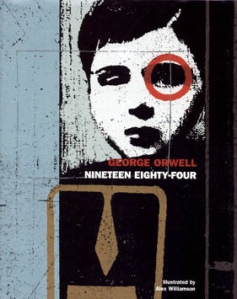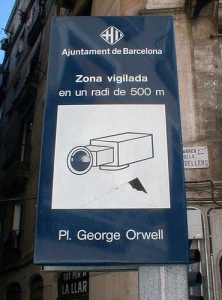The Orwell Prize for political writing announced its longlist for the 2011 prize in London last night. Of particular interest to me was the category for political blogging. I haven’t had time to digest all the blogs just yet but the most obvious thing to note how many entries from big, traditional media organisations, like the Telegraph and the BBC, now occupy the list. The longlist includes Politics Live from Andrew Sparrow of the Guardian; Fact Check from Cathy Newman of Channel 4 News (both excellent); Paul Mason’s Idle Scrawl (which has been longlisted before); Daniel Hannan of the Torygraph and Laurie Penny of the New Statesmen. That is nearly a quarter of the final 22.
Now all these blogs are far better than my efforts, lazy and half-baked as they usually are, but should they be there at all?. The Orwell Prize was established to award the writers that came closest to Orwell’s ability to “transform political writing into art”. So, for example, Andrew Sparrow’s daily missive’s are necessary reading, and helping to evolve a new form of journalism indeed, but such blogs are the polaroids of political writing, rather than the more detailed portraiture that I’ve always assumed the prize was their to promote. Paul Mason, bless him, admits as much today when he writes “good luck to all the real bloggers who don’t have a mainstream media pension, salary and self-censorship training to fall back on.” He’s right.
Luckily, the self-censored media don’t dominate the list and there’s a wealth of intelligent, independent blogging to pick over and help promote plurality in the public-blog-o-sphere. Anton Vowel’s Enemies of Reason writes about the media, mostly newspapers, picking on their inherent contradictions and biases and deploying some heavy sarcasm to great effect. Osama Diab’s The Chronikler seems pretty good, inherently strong on how it links technological issues to the upheavals in Arab world. While Prisoner Ben is an interesting addition because it’s the only blog being written (via the postal service) from inside a British prison. It’s got it’s fascination, although he lacks the eloquence of Peter Wayne.
Is anyone on the list raising political writing to an artform? I’m not sure, but I haven’t read everyone on the list. Even if not, who am I to complain as my idle thoughts wouldn’t even make the very longlist. It’s still a useful list and a meaningful prize, but political blogging is not yet the art form Orwell would have had in mind.

























Samppa 2:10 pm on January 22, 2013 Permalink |
Why? Don´t remember who many years have passed? Was it 2004? When it was Euro football or such? You teached me the essence of this writing, in some very lonely conversation in now passed way bar in Porvoo Finland. And that has still strugged me till today.